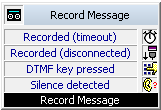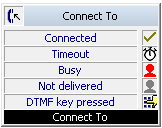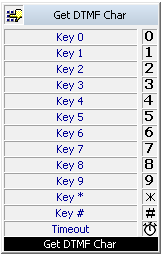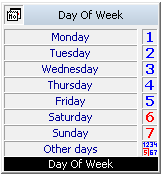2.6.2.1 Blocks for General Call Handling
Here you will find a table with an overview of all available general block types:
 |
Start
|
Default Block
This block is used in a script to start a rule (Start).
|
 |
Rule executed
|
Default Block
This block ends the script. Other rules will not be taken into consideration by the Call Routing Manager (Rule executed).
|
 |
Rule skipped
|
Default Block
This block ends the script. Other rules will be taken into consideration by the Call Routing Manager (Rule skipped).
|
 |
Disconnected
|
Default Block
If the call is disconnected (e.g. the caller goes on hook), the call handling will jump to this block and the script will continue the process from here (Disconnected).
|
 |
Play Announcement
|
Optional Blocks
The caller is played an announcement (Play Announcement).
|
 |
Choose Announcement
|
Optional Blocks
This differentiates between files by evaluating a variable and, thus, is plays a specific announcement in the sequence in which it occurs (Choose Announcement).
|
 |
Say Number
|
Optional Blocks
A sequence of digits is announced (Say Number).
|
 |
Say Date
|
Optional Blocks
With the help of this block, you can have the date announced (Say Date).
|
 |
Record Message
|
Optional Blocks
This block records the voice message of a caller, see Record Message.
|
 |
Connect To
|
Optional Blocks
This block places the call to the own or to another phone number by e.g. to Voice Box, see Connect To
|
 |
Connect To Loop
|
Optional Blocks
This block connects the call once again to your own number or to another number (Connect To Loop).
|
 |
FollowMe (Redirect Call)
|
Optional Blocks
This block attempts to connect the call sequentially to different numbers (FollowMe (Redirect Call)).
|
 |
Hold
|
Optional Blocks
This block puts a call on hold. The caller hears a defined music on hold (Hold).
|
 |
Activate
|
Optional Blocks
Activates a call, which has been put on hold with the block “Hold” (Activate).
|
 |
Wait for Disconnect
|
Optional Blocks
Monitors a successfully forwarded call to the end of the connection (Wait for Disconnect).
|
 |
Send email
|
Optional Blocks
An E-mail is sent, which can contain information concerning the call and a message (Send email).
|
 |
Voice Box
|
Optional Blocks
An announcement will be played and a message recorded. The message is displayed in the call journal of the relevant user/group ,and if configured, sent as an e-mail, see Voice Box.
|
 |
Remote Inquiry
|
Optional Blocks
This block allows to query the voice messages and e-mails from another port, see Remote Inquiry.
|
 |
Get DTMF Char
|
Optional Blocks
After a prompt, DTMF input is detected (DTMF key pressed).
|
 |
Get DTMF String
|
Optional Blocks
A sequence of DTMF characters is detected and assigned to a variable, see Get DTMF String.
|
 |
Terminate call
|
Optional Blocks
An existing connection is terminated (Terminate call).
|
 |
Situation
|
Optional Blocks
This block provides a decision option based on the situation of the subscriber called, e.g. “Absent” or “Speaking” (Situation).
|
 |
Call
|
Optional Blocks
This block provides a decision option based on the properties of the call, e.g. the caller’s number(Call).
|
 |
Time Check
|
Optional Blocks
This block provides a decision option based on the time of the call (Date/Time).
|
 |
Day of Week
|
Optional Blocks
This block provides a branching option based on the current day of the week (Day of Week).
|
 |
Set Variable
|
Optional Blocks
A variable is defined and set with a start value (Set Variable).
Alternatively, you can call a sub-program you have created yourself (The Use of a Visual Basic Script).
|
 |
Evaluate
|
Optional Blocks
A statement concerning a variable(s) is evaluated and branched accordingly (Evaluate).
|
 |
Script Code
Insertion |
Optional Blocks
Here you can insert a Visual Basic Script into the rule script (Insert Script Code).
|
 |
Run GSE Action
|
Optional Blocks
An action, which was created with the help of the Graphical Script Editor, is executed (Run GSE Action).
|
Last modified date: 06.16.2023